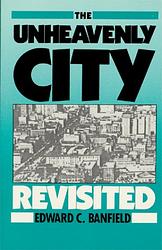The Unheavenly City by Edward C. Banfield
"The Unheavenly City" is a sociological analysis of urban life in the United States during the mid-20th century. The book examines the problems faced by cities and their residents, including poverty, crime, and racial tensions. The author argues that these issues are largely due to cultural and behavioral differences among social classes rather than economic inequality. He suggests that long-term planning and delayed gratification, traits more common in higher social classes, lead to better outcomes than the short-term focus often seen in lower social classes. The book's controversial views sparked debates about urban policy and social inequality.
The 2584th greatest book of all time
Ranking Details:
Our ranking system awards points to books based on their appearance and position on curated lists. Here's how it works:
Unranked Lists: For lists without specific rankings, each book receives points equivalent to the list's weight. This approach recognizes the book's inclusion on prestigious lists.
Ranked Lists: Books on ranked lists receive points in two ways:
- Base Points: Initially, every book is awarded points equal to the list's weight, acknowledging its significance.
- Bonus Points: Additionally, books earn bonus points based on their ranking. The total bonus pool, equal to 100% of the list's weight, is distributed among the books, with higher-ranked books receiving more points.
Exponential Distribution: The distribution of bonus points follows an exponential model. This means the top-ranked book (#1) receives significantly more bonus points than those further down the list (e.g., #100). Our algorithm ensures that higher placements are rewarded more generously, reflecting the achievement of a top rank on any given list.
This scoring system ensures that each book's ranking reflects both its presence on multiple lists and its positions within those lists, providing a comprehensive measure of its acclaim and popularity.
Total Points: 141
Since this book was first published in 1970, there is a penalty of 0%. The age adjusted score is 141.0.
This is to prevent newer books from reaching super high on the ranked list of the greatest books of all time. The greatest books should also stand the test of time.
- score: 141 -- The 100 Best Non-Fiction Books of the Century (Weight: 138)

